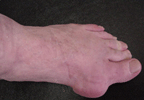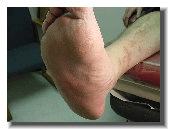I thought I would take a look at these from the view of a wife of a diabetic:
Seven Key Components
1. Emotional.
One way to begin evaluating your relationship is to ask yourself whether or not you basically “like” the person.
Is he or she really your close friend? Do you share interests? Is the person a good companion? Is your partner romantic, and do you feel romantically toward your partner?
Before diabetes...we were active ATVers. This has ended. He built N-scale model trains. Due to neuropathy, this has stopped. We went to the movies every Friday, this has stopped. I can't think of any interests we have in common any more. He prefers to stay home 24/7. I love getting together with my art pals. 100% sexual realtions stopped 3 years ago due to impotence caused by all his meds. Yes...no sex in 3 years. Sigh.
But he is a good companion....when he is not having a high or low.
2. Intellectual
Long-term, positive and sustained relationships are most successful when both partners value being involved with a growing, caring and intelligent person. Is your partner interesting? Is he or she on a search for learning? Is it important for him or her to do new things and do them well? Level of education is not necessarily an indicator on intellectual ability.
I think hubby is very interesting when not dealing with complications from diabetes. He has a brilliant mind - one of the things that attracted me to him. I love when he finds new computer gadgets and shares them with me. But I am truly concerned about his short term memory abilities since surgery. Only time will tell if they have been impared.
3. Physical and Sexual
In most new relationships, this area usually gets a very high score. As couples fall into a sexual routine, however, their romantic and loving behavior often is replaced with a contest to see who can help the other person reach orgasm fastest.
The physical aspect of a relationship requires work, attention to detail and an open, positive attitude. That attractive person you fell in love with 10 years ago may be now be bald, overweight or developing crow’s feet or other signs of aging. Your attraction to your partner needs a basis more than skin deep to last through a lifetime together.
Because he can no longer perform, he has no desire to even cuddle. He says the neuropathy in his arms makes it uncomfortable for me to touch him. We occasionally give each other a peck on the lips, zero passionate kissing as he says it depresses him. ;I tried to explain that there are numerous ways we can take care of this and he said he has no interest whatsoever. I have given up trying. It really is sad.
4. Communication
If the problems are minor and a couple communicates well together, the couple can often find solutions that prevent further deterioration of the relationship. Good communication requires being willing and having an effective style of communication. One method that works well is known as active listening. Sit down with your loved one, hold hands, look each other in the eyes and ask your partner to tell you what he or she needs to say. You then summarize and repeat back what your partner said before responding. Then your partner remains quiet and listens closely as you express your attitudes or feelings about the topic. He or she then summarizes what you have said before responding to your comments.
Well, you cannot communicate with a diabetic who is having a high/low. And because his diabetes is still out of control....that's most of the time around here. I don't think we have communication according to the above at all.
5. Timing
Sometimes people who are well matched do not stay together because the timing isn’t right. One person might be willing to make a total commitment but the other person will not because of issues related to school, finances or family
Timing is a major factor that can determine whether or not a couple will commit to marriage. Within a marriage, the couple’s daily schedule and whether they spend much time together, or, more important, enjoy spending that time together, are important influences on the relationship.
This one is interesting. We probably spend too much time together since he works from home and I am retired. Yet at the same time, we are not really "together". Do we enjoy being together? I think at this point is is more an alternative to being alone and we prefer being together than the being alone.
6. Attitudes About Mother or Father
Many experts believe that one of the major predictors of whether or not a couple will sustain a long-term relationship is the woman's attitude about her father and the man's attitude about his mother. If the woman's father was physically, sexually or verbally abusive, it might be very difficult for her to trust or respect men. If the man doesn’t respect or trust his mother, his ability to respect and trust women could be greatly diminished.
;I think we meet the above statement. But I think they completely left out how the woman feels about her husband's mother! LOL! That alone would be enough cause for me to end this marriage!
7. Miscellaneous
Other important aspects of a relationship that you should carefully consider are:
If you marry someone who is passionate about saving money and you love spending it, you are likely to have serious financial disagreements that could even lead to ending the marriage.
Many couples have conflicts about child rearing. Others fight about whether or not to have household pets or go camping, or about food or smoking. Think about what’s important to you and to your partner, and see if there are major differences that could result in conflict.
We have no financial arguments as our finances are separate. Our kids are grown. We have 2 dogs that I tolerate for his sake....I have never had indoor pets in my life and will not have them again.Neither one of us smoke. We are at opposite ends of the earth when it comes to religious beliefs.
These questions were presented on a diabetes website. Interesting to go through the process of applying them to our relationship. But I think the website left out so much.
1. Most of us are "blind" when we fall in love and would answer the questions much differently than we would after being married for 5, 10, 15, 20 years. Take into consideration as well that diabetes would have progressed over that same 5, 10,15, 20 years and the partner with the disease would no longer be the partner who first entered into the relationship.
2. A "close friend" at the beginning of a relationship could be a complete stranger after 20 years of marriage due to complications of diabetes, neuropathy, memory loss and more.
I could go on forever, you get the idea! So, I decided to look up information about the author. I doubt it's been written by the spouse of a diabetic!!!
R. Keith Campbell, RPH, CDE. Part of the dlife advisory board. Associate Dean and professor of PHARMACY Practice. an "intellectual"leader in the field of diabetes. Recipient of the American Association of Diabetes Educators Distinguished Service Award. Author of ADA/PDR Medications for the Treatment of Diabetes by Physicians (wonder if he knows about Humulin R-U 500 in hospitals???)
So nowhere did I find that he has diabetes or is married to a diabetic. Yet he is writing about the relationships of spouses of diabetics. Interesting, huh?
Hard for me to fathom how anyone who has never experienced this can write about it. :o)
DW
So, I think there are so many things that website left off!
Wednesday, April 13, 2011
Subscribe to:
Post Comments (Atom)



3 comments:
and, here I will risk offending husbands everywhere,
but, he is a husband not a wife
it is my opinion that men see things differently than women
after all
there are men who are sympathetic
but we do have something of a "sisterhood" here......
just a thought
DW,
Are you understanding more why I believe you need to address this issue? The issue of life as a spouse with a diabetic husband. You have the talent, you have the knowledge: You have the voice.
S
Unfortunately, I definitely relate to most of your additions to the original article. Things have changed so much in our home, there is very little (if any)intimacy of any kind. A lonely place to be indeed. I think for us, it is also a choice to remain together instead of totally alone . . . but that doesn't mean I don't often feel "alone" in my own house!
As for the man who wrote this, I'm thinking he is not exactly an expert on the subject . . . what was he thinking?
Post a Comment